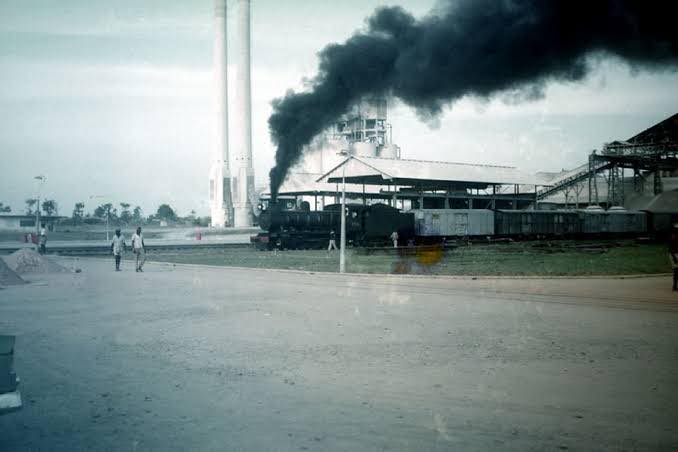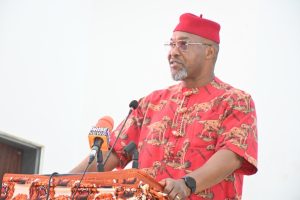Nkalagu and the Cement Industry in Nigeria: A Forgotten Legacy in the Midst of a Billion-Dollar Market
In April 2025, Dangote Cement, Nigeria’s most dominant cement producer, celebrated its trade partners in grand fashion. Distributors walked away with gifts and cash rewards exceeding ₦11 billion. During the lavish event, the company’s founder and Africa’s richest man, Aliko Dangote, mentioned that his company currently controls over 57% of the cement market in Nigeria. That comment struck a chord.
In 2017, Dangote Cement held a massive 65% share of the market, showing that although it still dominates, the market has grown more competitive. Companies like Lafarge Africa, BUA Cement, Purechem, and the newly established Mangal Cement are now contending for the remaining 43% of market space. The cement sector, no doubt, remains one of the most fiercely contested and rewarding industries in the country.
But amid the celebratory mood, I couldn’t help but reflect on one name that has long disappeared from the list of active players in Nigeria’s cement ecosystem: Nigercem.
Located in Nkalagu, a town in Ebonyi State, Nigercem (Nigeria Cement Company) holds the historical title of being the first cement manufacturing company in Nigeria. Established in 1954 by the government of Eastern Nigeria with the encouragement of Sir Louis Odumegwu Ojukwu, Nigercem was a pioneering industrial milestone, not just for Nigeria, but for the entire African continent. At its zenith, Nigercem was not only the biggest cement factory in Africa but also a powerful employment engine, boasting a workforce of over 1,400 people.
YOU MAY READ
Dangote Refinery Defends Pricing Strategy
Nkalagu was not randomly chosen. It was a strategic decision based on the town’s rich deposits of limestone and coal—two vital ingredients in cement manufacturing. The geological advantage of Nkalagu made it an industrial goldmine. For years, Nigercem thrived, representing the industrial dreams of Nigeria’s post-colonial era. It symbolized what was possible when strategic resources, vision, and political will converged.
Yet, in 2025, the once-glorious Nigercem stands as a decaying structure, an abandoned monument to a lost industrial dream. After years of neglect, it was eventually acquired by the Ibeto Group, led by Cletus Ibeto, a respected Nigerian industrialist. At the time of the acquisition, hopes were high. Ibeto had both the capital and the industrial experience to revive Nigercem. However, over a decade has passed, and nothing significant has happened. Nigercem remains moribund, an industrial relic surrounded by economic silence.
Even more perplexing is the fact that no other cement company—not Dangote, not BUA, not Lafarge, and not even Mangal—has shown interest in reviving the Nkalagu plant or establishing new facilities in the area. This is puzzling for multiple reasons.
First, the raw materials that justified Nigercem’s creation are still in abundance. The limestone and coal fields of Nkalagu remain largely untapped. Second, the Southeast region is arguably the biggest consumer market for cement in Nigeria, driven by a high rate of construction activities, especially private real estate development by Igbos at home and abroad. Third, the cost of transporting cement from Kogi, Benue, Sokoto, or Ogun to the Southeast is both economically inefficient and logistically burdensome.
YOU MAY READ
Cabals Still Fighting Against Our Refinery — Dangote
Let’s examine some possibilities. Could insecurity be a factor? While parts of the Southeast have experienced periodic unrest due to separatist movements and military operations, Ebonyi has generally maintained relative stability. Moreover, the federal and state governments have often reiterated their commitment to encouraging investment in the region.
Is it an issue of political will? Possibly. Successive state governments in Ebonyi have made bold claims about their commitment to industrial revival, but these claims have rarely translated into tangible action. There appears to be a lack of coordinated public-private efforts to make Nkalagu attractive again.
Could it be a matter of corporate politics and market dominance? Dangote Cement and BUA have invested heavily in regions like Kogi, Edo, and Ogun. The idea of building new plants in the Southeast may not be seen as necessary for market expansion. The current model of distribution allows them to supply the region without establishing new production centers there.
Then there is the curious case of the Ibeto Group. When Cletus Ibeto acquired Nigercem, there was national excitement. Here was an Igbo industrialist reclaiming an Igbo legacy. It was expected that he would use his resources and experience to transform Nigercem into a competitive player in the national market. Unfortunately, the expectations have not been met. Whether due to legal battles, funding issues, or internal corporate strategy, Nigercem under Ibeto remains in limbo.
Which leads to another pressing question: Where are the other Igbo billionaires and industrialists?
The Southeast is brimming with wealthy entrepreneurs who have made fortunes in various sectors, from trading and manufacturing to oil and gas. Men and women who have built empires. Yet, none have ventured into the cement industry—a sector that, as of 2025, remains one of the most lucrative in Nigeria.
To put it into perspective, from January to March 2025 alone, Dangote Cement reported sales worth ₦994.659 billion and profits of ₦311 billion. BUA Cement, during the same period, sold ₦290 billion worth of cement and made ₦81 billion in profit. These are astronomical figures, rivaled only by the financial sector.
The cement industry in Nigeria is a cash cow. High demand, limited producers, and constant price increases ensure that profits remain high. It’s no surprise then that Aliko Dangote has poured billions into expanding his cement empire across Nigeria and into other African countries. The same is true for Abdul Samad Rabiu of BUA, who has strategically positioned his factories in resource-rich and logistics-friendly states.
So again, why has no one attempted to do the same in Nkalagu?
Reviving Nigercem would require substantial investment, no doubt. Modern cement plants are capital-intensive. The $1 billion spent by Dahiru Mangal to establish his new factory in Iddo, Kogi State, is a clear indication of what it takes. But it is equally true that such investment yields returns quickly due to the sheer profitability of the business.
Could the problem be cultural? Perhaps the Southeast’s industrial vision has not evolved past traditional business sectors. There is a noticeable gap in heavy industry participation among Igbo entrepreneurs. Trading, logistics, and light manufacturing dominate, while sectors like petrochemicals, mining, and cement are largely ignored.
This is not for lack of capability. The entrepreneurial spirit in the Southeast is unmatched. But the absence of collective industrial strategy, absence of consortia, and limited access to large-scale funding mechanisms might be part of the puzzle.
Moreover, there is a need for a coordinated vision between governments and the private sector. A public-private partnership model that includes access to land, tax incentives, and infrastructure development could easily make Nkalagu the new hub of cement production in Nigeria.
What is needed is a catalyst. A single investor or a group of investors willing to take the initial risk and break the industrial inertia surrounding Nigercem. Once that happens, the domino effect could bring in others.
At the heart of this issue lies a bigger question: How do we reclaim our industrial heritage and reposition it for the future?
Nkalagu was once the industrial heartbeat of Nigeria. It can be again. The raw materials are there. The market is there. The historical legacy is there. What is missing is the will to act.
Reviving Nkalagu is not just about cement. It is about vision, pride, and reclaiming lost industrial glory. It’s a call for strategic investment, bold thinking, and a renewed focus on building industries that last.
If Nigeria is serious about economic diversification and industrial development, then places like Nkalagu must not be ignored. And if Igbo entrepreneurs are serious about reclaiming their place in the national industrial landscape, then Nigercem must rise again.
Nkalagu and the Cement Industry in Nigeria
Dangote Cement, Nigeria’s biggest cement company by revenue and size, recently celebrated its trade partners, known as Dangote Cement distributors, and shared over ₦11 billion in cash and gifts with them.
While watching the founder of the cement company Aliko Dangote celebrate its distributors, he said something that struck me.
His company controls over 57% of the cement market in Nigeria, leaving others like Lafarge Africa, BUA Cement, Purechem, and others to battle for the remaining 43%.
Dangote Cement’s market dominance used to be 65% in 2017, showing how fierce and the fluidity the cement market is.
After the event on TV, i checked and found that no cement manufacturing company has a presence in Nkalagu, Ebonyi State, as of today.
Mangal Cement, owned by Alhaji Dahiru Barau Mangal, ( the same person who owns Max air) is the newest cement brand in the market.
He spent over $1 billion to build his cement factory in Iddo Kogi State.
But it was not always like this.
In 1954, the government of Eastern Nigeria, encouraged by Sir Louis Ojukwu, built the first cement company in Nigeria, known as Nigercem.
At its peak, it was the pride of Nigeria as it was the biggest cement company in Africa.
It was also the first cement company in Nigeria, long before Dangote Cement of this world.
Nkalagu was chosen for a good reason – the community has an abundance of high-quality limestone and coal, necessary for cement production.
That was what made Nigercem flourish at its peak because of its proximity to raw materials.
To show how big Nigercem was, it used to have 1,400 staff working for the cement company before it crumbled.
Today, Nigercem is moribund and old shadow of itself , even with the promise by Cletus Ibeto, who later bought it, to revive it.
Nothing has happened to the flagship of Nigeria’s cement industry since Ibeto acquired it.
More surprisingly, Nigerian cement companies are shying away from investing in Nkalagu, even when the Southeast is their biggest retail market and Nkalagu has an abundance of coal and limestone, critical components needed for cement manufacturing.
Dangote Cement has factories in Benue, Kogi, Edo, and Ogun States.
BUA factories are in Edo and Sokoto States.
Mangal is in Kogi.
So, I used to think about this: Is there any reason why Nigerian cement companies are running away from setting up their plants in Nkalagu?
Is the community unsafe and unattractive for investment?
What about Nigercem and Ibeto? What is stopping Ibeto from reviving Nigercem?
Finally, the cement market is highly lucrative and one of the few businesses in Nigeria that give insane returns.
This year alone, Dangote Cement has sold cement worth ₦994.659 billion with a profit of ₦311 billion.
BUA Cement sold cement worth ₦290 billion with a profit of ₦81 billion.
The sales were from January to March this year, and no other business in Nigeria, with the exception of banks, made this kind of revenue and profit from the Nigerian market.
What is stopping our Igbo billionaires and business moguls from setting up a cement plant in Nkalagu, since the big guys are running away from doing so?
Does anyone have an answer to why this is s
Credit: Chukwudi Iwuchkwu





